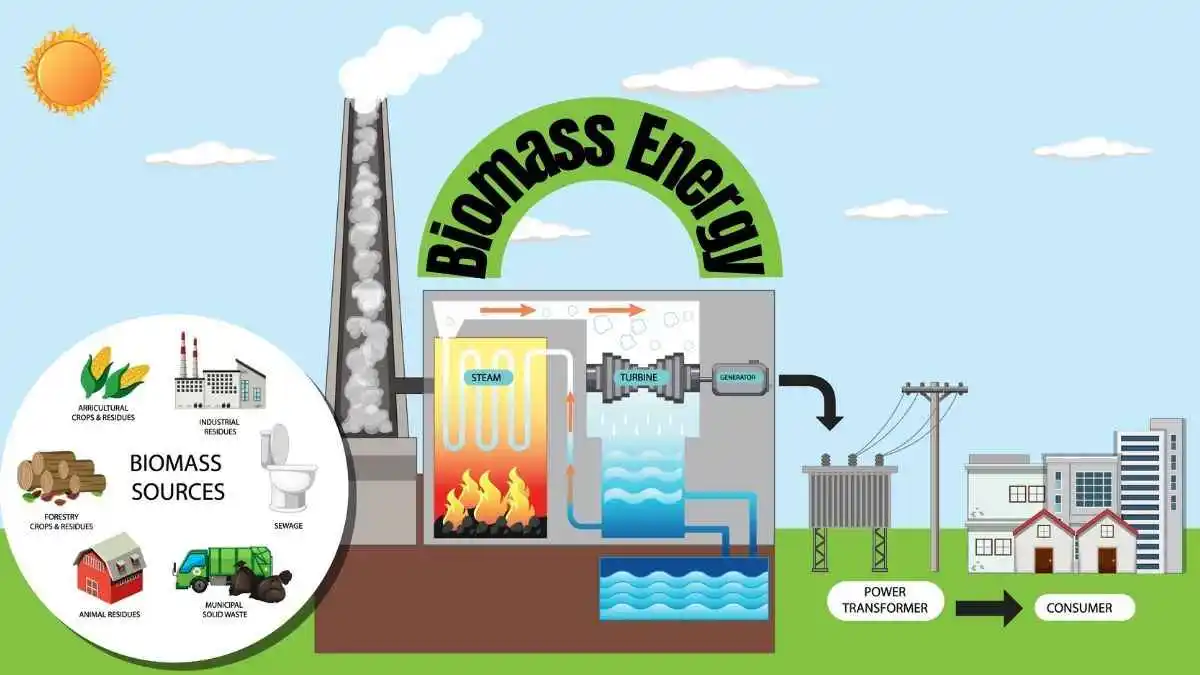Biomass energy is a light of hope and sustainability in the ever-changing world of renewable energy. Understanding the idea of it and its advantages is critical as we negotiate the problems brought by climate change and the need to minimize our dependency on fossil fuels.
This article digs into the details of biomass energy, describing its definition, operating principles, environmental effect, it will provide in 2023.
What is Biomass Energy and its Benefits in 2023?
Biomass energy, often known as bioenergy, is a renewable energy source that extracts energy from organic substances such as plants and animal waste. This energy may be used for a variety of reasons, including power generating, heating, and fuel manufacture.
What makes it more appealing is its capacity to handle two crucial issues at the same time: trash management and sustainable energy generation.
Also Read: What Is The Importance Of Solar Energy In 2023?
Key Benefits of Biomass Energy
- Reduced Carbon Footprint: Biomass energy is considered carbon-neutral because the carbon dioxide emitted during burning is balanced by the carbon dioxide absorbed during biomass feedstock growth. This results in a large reduction in greenhouse gas emissions, which helps reduce climate change.
- Renewable Resource: In contrast to limited fossil fuels, biomass is a renewable resource that can be renewed indefinitely via prudent land management and agricultural methods.
- Energy Independence: Regions can minimize their dependency on imported fossil fuels by using locally accessible biomass feedstocks, improving energy security and decreasing economic vulnerability.
- Diverse Applications: Biomass may be turned into a variety of energy sources, including heat, electricity, and biofuels, making it flexible to a variety of energy requirements.
- Balancing Grid Reliability: Biomass power plants can supply consistent and dispatchable electricity, helping to balance the inconsistent operation of other renewable sources such as wind and solar.
- Soil Enrichment: Energy crop cultivation for biomass energy can increase soil quality and health, minimizing loss and increasing total ecological life.
- Responsible Land Use: Biomass agriculture, when managed responsibly, encourages responsible land use practices, protecting biodiversity and reducing deforestation.
- Economic Growth: The biomass business boosts local economies by providing employment, investing in infrastructure, and fostering renewable energy research and development.
Also Read: What Are Geothermal Power Plants?

Biomass Energy and Environmental Impact
As we move toward a better future, evaluating the environmental effect of energy sources becomes increasingly important. It has huge potential in this regard.
It offers a range of environmental benefits, including:
- Carbon Neutrality: As previously stated, the carbon dioxide emitted during biomass burning is compensated by the carbon dioxide absorbed during biomass feedstock growth.
- Reduced Greenhouse Gas Emissions: It minimizes total emissions by using waste materials that would otherwise degrade and emit methane, a strong greenhouse gas.
- Sustainable Resource Management: Biomass farming has the potential to regenerate damaged areas, avoid deforestation, and promote sustainable land use practices.
Also Read: What Are The Advantages Of Wind Energy?

Conclusion
As we face the problems of an energy-hungry world and the urgent need to tackle climate change, it appears to be a possible option. Its potential to offer clean and renewable energy while also solving waste management challenges demonstrates its importance. Adoption of it in 2023 and beyond might imply a more green and sustainable energy future.
FAQs
Q: How does biomass energy compare to solar or wind power?
It provides a consistent and dependable source of energy.
Q: Are there any drawbacks to biomass energy?
While it provides various advantages, there are some issues, such as air pollution from incomplete combustion and possible resource rivalry between energy crops and food crops.
Q: Can individuals contribute to its adoption?
Absolutely. Individuals may help to accelerate the use of it by practicing responsible waste management, advocating for renewable energy regulations, and investing in energy-efficient devices.




